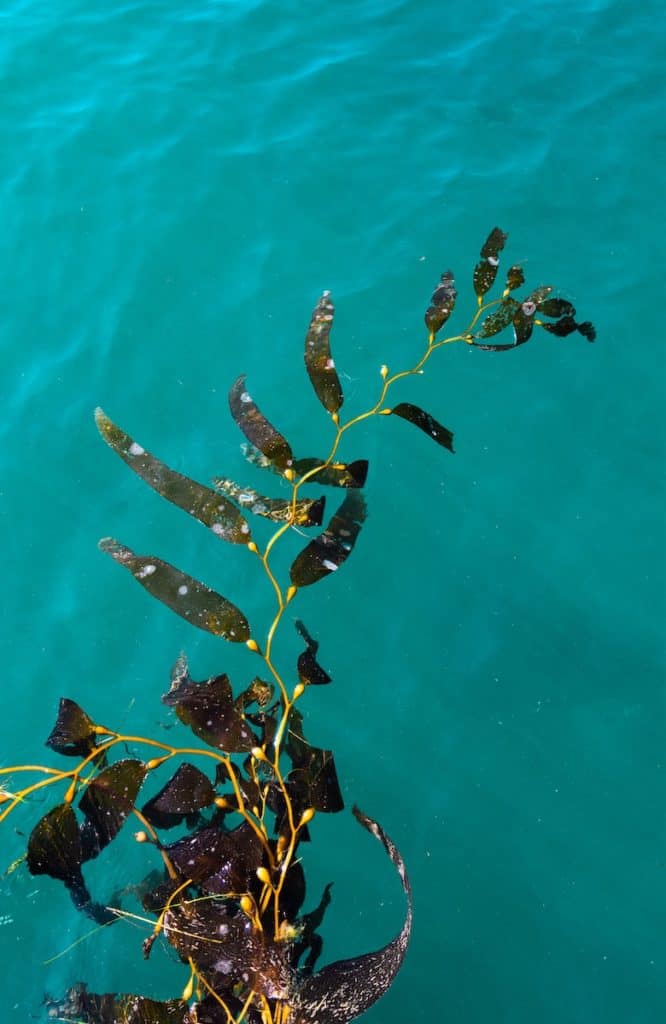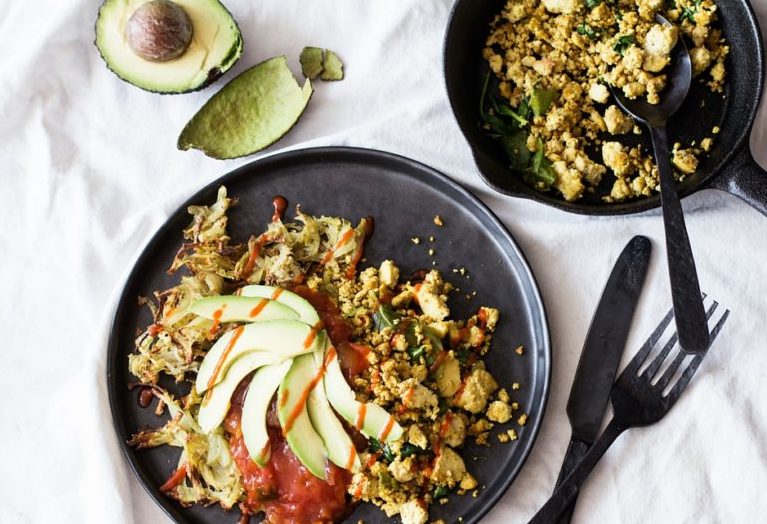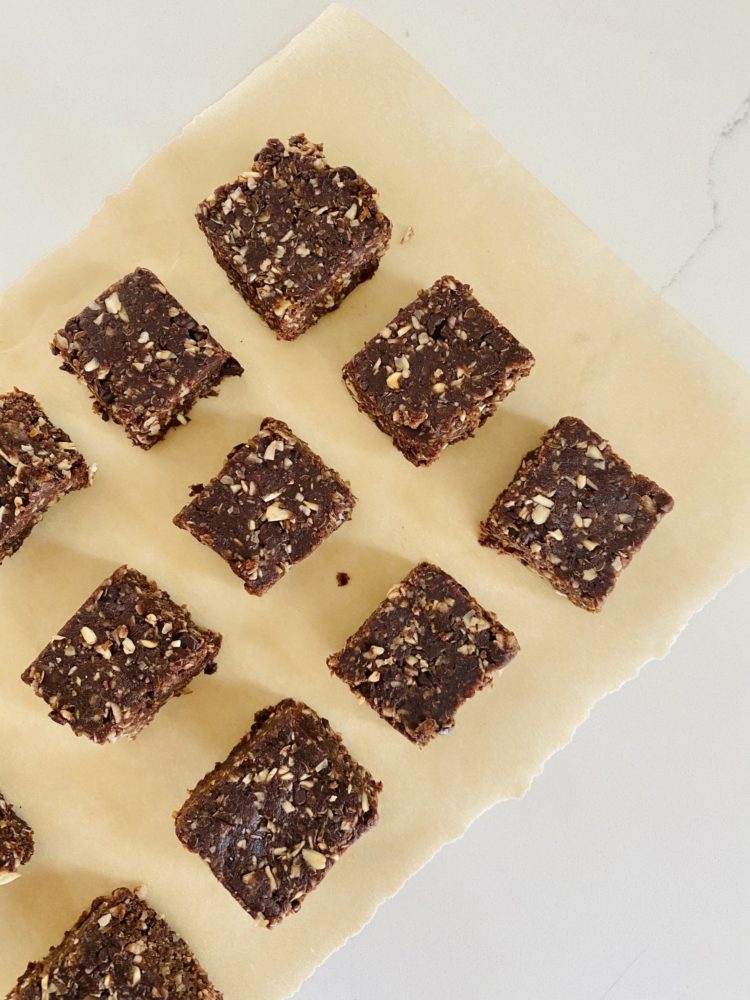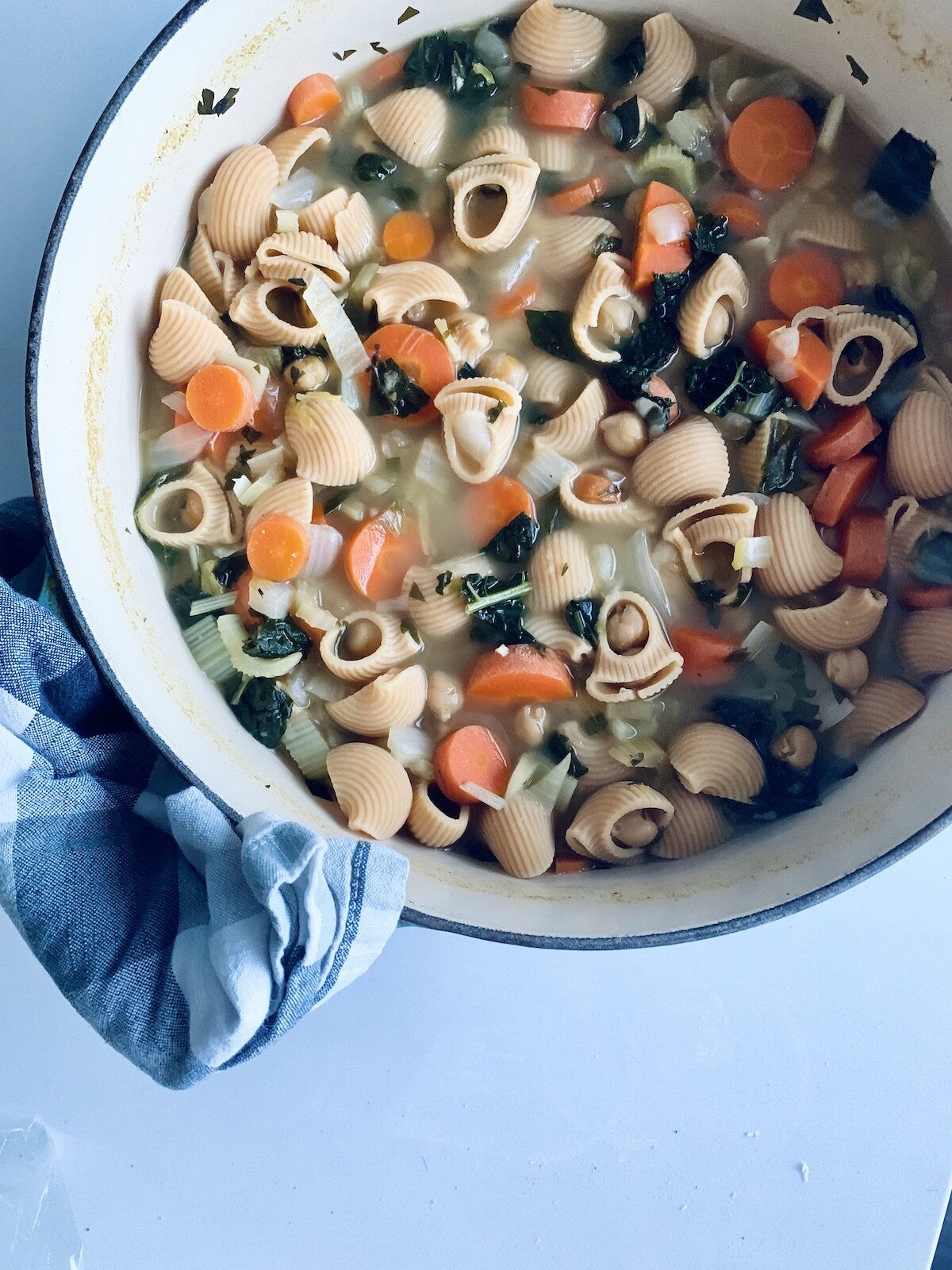Iodine is a nutrient that you might not give much thought to – where it comes from, why, it matters, or how to get enough. If you’re a vegan or plant-based woman, then it might be on your radar since it’s most commonly consumed in seafood. In this post, you’ll learn how to get iodine from plant-based foods and also why it’s so important for women’s health. Let’s dive in!

What is iodine?
Iodine is a vital trace element that plays a critical role in the body, primarily in the production of thyroid hormones. These hormones are essential for regulating various physiological processes, including metabolism, growth, and development. Iodine is predominantly found in seawater and is absorbed by marine life, consequently making seafood and certain sea vegetables rich sources of this nutrient.
In the human body, iodine is essential for the synthesis of two key thyroid hormones: thyroxine (T4) and triiodothyronine (T3). These hormones regulate metabolism, influence energy levels, and are crucial for the proper development of the brain and nervous system, particularly during fetal development and infancy. Insufficient iodine intake during these formative periods can lead to severe developmental issues, including cognitive impairments and growth deficiencies.
While iodine is naturally present in various foods, it is also commonly added to table salt in the form of iodized salt to help prevent deficiencies in the population. Salt iodization is recommended by the World Health Organization, but the practice is voluntary in the United States.
The amount of iodine in food can vary significantly depending on the iodine content of the soil in which plants are grown or where animals are raised. Regions with iodine-poor soil are more likely to see higher rates of iodine deficiency among their populations. Consequently, individuals who do not use iodized salt, consume limited animal products, or live in areas with low iodine levels may be at increased risk of deficiency.
Why do women need iodine?
Iodine is a trace mineral that helps to produce thyroid hormones. It can play a role in PCOS, fertility, irregular periods, and thyroid health. It’s especially critical for pregnant women because it plays a key role in fetal brain and bone development. Most people just barely meet their needs through food. Because it is so important for women’s health, it’s worth making sure you’re getting enough.
Additionally, iodine supports the metabolism of cells, ensuring that energy production is efficient. Women, in particular, can face various hormonal fluctuations throughout their lives, from menstruation to menopause. Without adequate iodine levels, these processes can become disrupted, leading to symptoms of fatigue, weight gain, and mood changes.
The thyroid gland requires iodine to synthesize thyroxine (T4) and triiodothyronine (T3), which are crucial hormones responsible for regulating metabolism, heart rate, and even how your body reacts to other hormones. Low iodine levels can lead to hypothyroidism, a condition marked by a slowdown of bodily functions including metabolism and energy levels. In contrast, excessive iodine can cause hyperthyroidism, which can lead to symptoms like anxiety, rapid heart rate, and unintended weight loss.
Ensuring sufficient iodine intake is not just about maintaining thyroid health; it also has implications for overall hormonal balance and reproductive health. For women dealing with conditions like polycystic ovary syndrome (PCOS), proper iodine levels can aid in managing symptoms and promoting menstrual regularity. In summary, adequate iodine intake is essential not just for thyroid function but also for broader aspects of women’s health, including fertility and pregnancy outcomes.
Are vegans at risk of iodine deficiency?
Vegans who do not use iodized salt may be at an increased risk of iodine deficiency because so few plant-based foods contain iodine. Iodine is crucial for the production of thyroid hormones, which play an essential role in metabolic regulation and overall health. While the general recommendation for adults is around 140 micrograms (μg) of iodine daily, plant-based women who don’t eat iodine-rich foods like fish, dairy, and eggs, may find it challenging to meet their iodine needs through diet alone.
The primary sources of iodine in non-vegan diets are found in sea fish, shellfish, and dairy products. For vegan and plant-based women, sources of iodine are more limited, and their iodine content can vary significantly depending on the iodine levels present in the soil where the plants are grown. While some plant foods, like grains and certain vegetables, contain trace amounts of iodine, these levels are often insufficient to meet daily requirements.
Iodized salt is a notable source of iodine and can be a great option for meeting needs. However, for people aiming to limit their sodium intake, this might not be the best option. Read more about sodium and women’s health in this post.
Sea vegetables are an exceptionally rich plant-based source of iodine. For vegans, incorporating seaweed varieties, such as nori, into their diet can help bridge the gap in their iodine intake, with just one and a half to two sheets (approximately 4 grams) providing the recommended daily intake.
Given these challenges, vegans should be aware of their iodine status and consider potential supplementation or iodine-fortified foods. Talking to a registered dietitian educated in plant-based nutrition can provide tailored advice for achieving sufficient iodine intake, ensuring that a vegan diet remains balanced and healthful while minimizing the risk of deficiency.
What Are The Symptoms of Low Iodine?
How do you know if you’re low in iodine? Here are a few symptoms to look for:
- Unexplained weight gain
- Low energy and fatigue
- Hair loss
- Feeling cold
- Irregular periods
- Hypothyroidism
- Goiter
- Miscarriage, still birth, and preterm delivery in pregnancy
Many people who are borderline low may not experience these obvious symptoms. Instead, they might just experience mild unexplained fatigue and other unexplained health issues.
Plant-based Foods High in Iodine
Ensuring adequate iodine intake is crucial for maintaining optimal thyroid function and overall health, particularly for those following a plant-based diet. While plant foods generally offer lower iodine levels compared to animal products, there are still several options available for vegans and vegetarians. Here are some plant-based foods that can help you boost your iodine intake:
- Seaweed: One of the richest sources of iodine for plant-based eaters, seaweed varieties such as nori, kelp, and dulse can provide significant amounts of this essential mineral. For instance, just one and a half to two sheets of nori (about 4 grams) can contribute to your daily intake of iodine. Incorporating seaweed into meals, whether through sushi, salads, or snacks, can be an effective way to boost iodine levels. However, many experts advise not relying on sea vegeagbltes to meet iodine needs because their iodine contents varies so much.
- Fortified Foods: Certain foods are fortified with iodine, making them excellent options for those who may struggle to meet their iodine needs through diet alone. For example, some brands of plant-based milk, such as soy or almond milk, may contain added iodine. Similarly, fortified bread made with iodized salt is widely available and can help provide the necessary amount of iodine.
- Iodized Salt: Although many public health guidelines recommend limiting salt intake for overall health, using iodized salt in moderation can be a practical way to include iodine in your diet. As a guideline, just over half a teaspoon of iodized salt can meet the recommended daily intake of iodine. However, it’s important to balance salt consumption with other dietary needs.
- Other Plant Foods: While fruits and vegetables are generally low in iodine, certain options can contribute small amounts. For instance, potatoes, cranberries, and strawberries have been noted to contain trace levels of iodine. Including a variety of fruits and vegetables in your diet is essential for overall nutrition, but don’t rely solely on these for your iodine needs.
- Supplements: If dietary sources are insufficient, considering an iodine supplement may be necessary, particularly for those who are pregnant, breastfeeding, or have increased nutritional needs. Always consult with a healthcare provider before starting any new supplement regimen to determine the appropriate dosage and ensure it aligns with your dietary requirements.
While plant-based diets can pose challenges in meeting iodine needs, incorporating iodine-rich foods such as seaweed, fortified products, and iodized salt can help ensure adequate intake. Monitoring iodine levels is especially vital for vulnerable groups, including pregnant and breastfeeding individuals, to support healthy thyroid function and overall well-being.
How to get iodine as a vegan or plant-based woman
Only a few foods contain iodine, including seafood. Dairy is another common source, but dairy isn’t a natural source. Dairy cows are often given supplements, and iodine from cleaning solutions used on dairy farms leeches into the milk (yikes!).
Plant foods naturally contain trace amounts, depending on how mineral-rich the soil is that it was grown in. Sea vegetables are a notably high source. It’s safe to eat sea vegetables as much as a few times per week to meet needs. Because the iodine content of seaweeds tends to vary widely, you don’t want to overdue it. There is such thing as too much!
Try sipping on this mineral-rich vegan “bone” broth to get your seaweed fix.
In the early 20th century in the United States, deficiency was a common health issue. That’s when iodine started being added to table salt, known as iodized salt. So, you can meet needs with just a 1/4-1/2 teaspoon of iodized salt a day which equates to just 580-1160 mg of sodium. If you’re not a seaweed fan, a small amount of iodized salt each day is an easy and safe way to meet iodine needs. Certain brands like this one now after iodized sea salt options.
If you are concerned about salt or sodium, read more about sodium and women’s health here.
How much iodine do vegans need?
Iodine needs change throughout a woman’s life. It is one of the nutrients that increases as a woman transitions from pregnancy to breastfeeding. Getting enough is critical at all stages of life, but especially for pregnant and breastfeeding women because of iodine’s role in fetal brain development.
The recommended daily allowance (RDA) for iodine varies for women based on their life stage. For most adult women, the RDA is set at 150 micrograms (mcg) per day. However, during pregnancy, the requirement increases significantly to 220 mcg per day to support the health of both the mother and developing fetus. This higher intake is crucial as iodine plays a vital role in the production of thyroid hormones, which are essential for growth and development. Additionally, nursing mothers also have elevated iodine needs, highlighting the importance of adequate iodine consumption during these key periods. Given these increased requirements, it is recommended that women planning to become pregnant consider taking a prenatal vitamin that contains at least 150 mcg of iodine to help prevent deficiency.
Women’s Iodine Needs

Should you take an iodine supplement?
Because it’s easy to overdue it with iodine and get too much, you should exercise caution with supplements. Only take a supplement after speaking with your healthcare provider. It’s best to start with trying to meet your needs through whole foods and through modest amounts that are included in multivitamins (in a prenatal, for example). You can find vegan supplements – just do your research first!
Tips For How To Get Iodine
- Use 1/4-1/2 tsp of iodized salt daily in cooking and seasoning
- Eat sea vegetables 2-3 times per week (try my vegan bone broth)
- Consider taking a modest (75-150mcg) supplement 3-4 times per week (talk to your healthcare provider first!)
- If you are pregnant or breastfeeding, make sure that your prenatal or postnatal multivitamin contains at least 150mcg of iodine
Need some easy meal inspiration?
Grab my free 62 Plant-based Meal Ideas guide filled with easy ideas for breakfast, lunch, dinner, and snacks.
BTW, you might also like 7 Causes of Hormone Imbalance and How To Balance Hormones Naturally.


